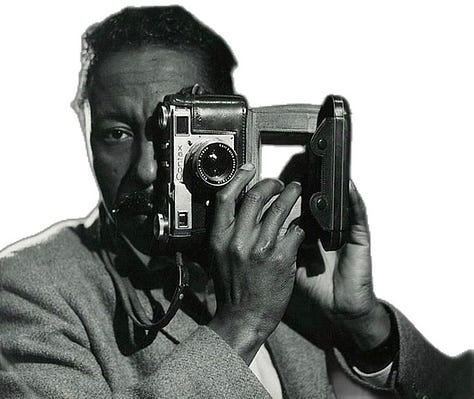
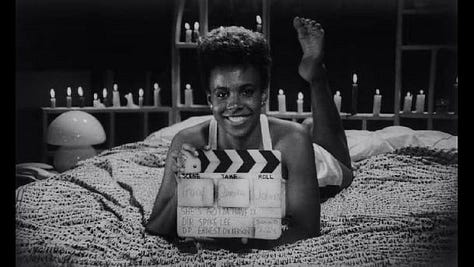
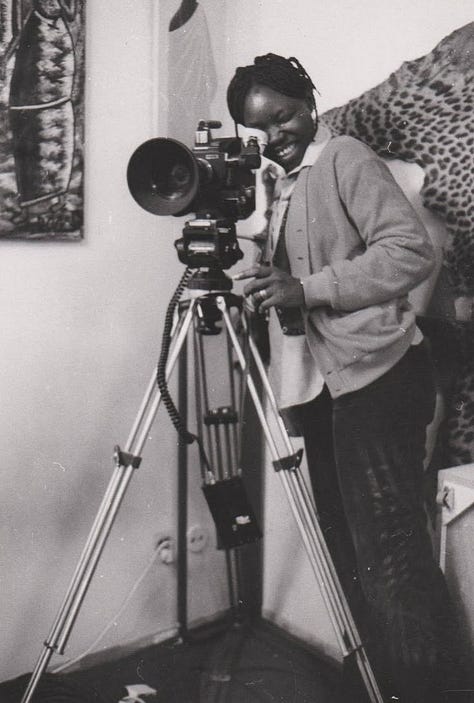
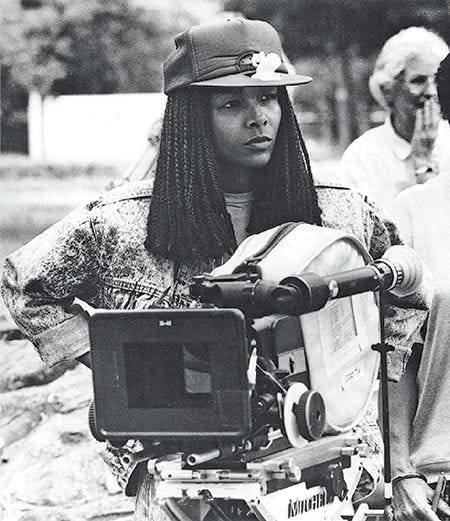
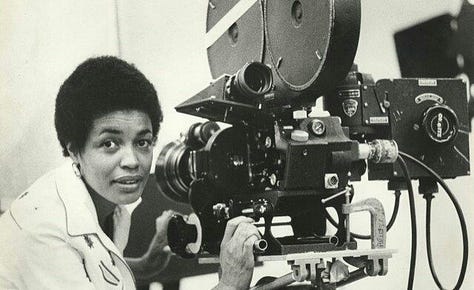
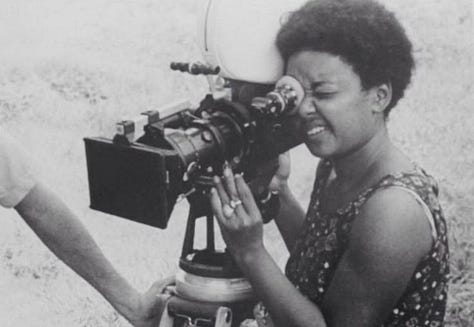
When I made the choice to pursue filmmaking, I did so from the purest and most optimistically delusional place. I didn’t think about how unyieldingly gatekept the film industry is or the overwhelming barriers that make it challenging for people who are not wealthy, white, or cis-men to get their films made. All I knew was that I had a deep passion for storytelling, a sharp visual eye, a collaborative spirit, and the determination to get my ideas out into the world. As much as I love the medium, I have started this journey during a less than ideal time. In 2023, I debuted my short film at The Micheaux Film Festival in Los Angeles in the middle of the WGA writer’s strike. Nearly two years after the strike, many writers are struggling to find work or opting to leave the industry altogether.
Watching all of this from the sidelines, I’ve reflected a lot about the space I want to occupy in the film industry. Even before the WGA strike, I was not particularly interested in being part of Hollywood. Having worked in creative production for the past six years, I’ve had enough interaction with people who work in entertainment to understand how much authenticity is sacrificed to acquire mainstream success. As a Black person, there is the added complexity of how our double consciousness can morph into a cognitive dissonance that influences some Black people to align themselves with the ideas of success that have been propagated by the dominator culture.
How many times have we watched a beloved underdog become an agent of capitalism? Whether it’s Spike Lee selling us Jordans, Quinta Brunson telling us to sign up for TurboTax, or Issa Rae selling us prosecco, there is always this pull for people in entertainment to not just create art but to become a brand, and whether the moves are being made because an artist simply enjoys making money or if they’re doing it because they’re trying to generate multiple revenue streams to survive a volatile industry, it’s worth asking ourselves what it says when some of the most visible pioneers of Black TV and film are not just creative visionaries, but products as well.
The intersections of visibility, marketability, and profitability of a filmmaker’s brand often shift depending on the demographic a filmmaker represents. While it’s not uncommon for white male filmmakers to sell products (see Singani63 and Coppola Winery), they do not come from cultural backgrounds that are commodified and often diluted and repackaged for mainstream appeal the way Black filmmakers do. So, the business ventures do not just line the pockets of artists-turned-entrepreneurs, they also benefit an industry (and system) designed to exploit underrepresented audiences. I’ve had many conversations with Black and POC filmmakers who have expressed their frustrations with having to explain aspects of their work that they would never have to explain to their audience because the executives who are holding the purse strings are privileged, white, and insular.
All of this influences not just the type of shows and television we get to see but also how the perceptions of who we are as people are shaped. For anyone who thinks that film is just a means of entertainment, check the history books for the impact the film The Birth of a Nation (1915) has had on the culture (that we are still grappling with today). And while we haven’t seen any films that racist get created in a long time, the way the far-right has emboldened racists to be loud again, I think that at worst, we can anticipate racist imagery making a major comeback, and at best, we’ll get more flattened, one-dimensional and palatable representations that aim to snuff out any bold or empowering expressions of who we are on the screen. So, where does this leave all of us little guys? The people who are hungry to tell stories that are not shaped by financiers who are not part of our communities? Well, we have to do the same thing we do when we’re writing our stories: tap into our imaginations. Below are some ideas I have that I believe can create an equitable and sustainable independent film industry and while much of it is idealistic none of it is impossible.
PAY EQUITY AND ERASING “THE LINE”
Filmmaking is a collaborative process. Depending on the scale of your film, you could be working with a handful of crew and talent to hundreds of people on set. Every single role on a film set is important in ensuring the production process runs smoothly, and the film is captured in the way it was envisioned. Unfortunately, the current hierarchies in place ensure that the people who make the most money on a film are the studios, distributors, and, in some cases, the high-profile actors that star in the film. I recently read about how the A24 film Sing, Sing paid everyone on set the same fee, in addition to giving everyone equity in the film. This is a rarity in Hollywood, where typically only people above the line (directors, actors, producers, screenwriters, actors) earn equity, and people below the line (crew members, sound engineers, and editors) just take an hourly or daily rate. I absolutely love this concept because not only does it allow everyone who worked on a film to continue earning residual income from it, but removing the hierarchy reinforces an attitude that everyone is working in service of one another toward one common goal, and it also erases the pay gap. I think this approach will turn off a lot of people who are primarily working in the film industry to make a significant amount of money, and honestly, that is exactly what we need. Employing pay equity levels the playing field and values the contribution each person makes in the filmmaking process.
ENVIRONMENTAL SUSTAINABILITY
One of the most emotionally distressing things about working in production, for me, is how wasteful it can be. I have worked on one-day productions where thousands of dollars worth of florals were thrown out. I’ve had to organize pickup of free furniture items on Craigslist and Facebook marketplace that would’ve otherwise gone into a landfill. Our environment is in crisis, and I think production companies can be more thoughtful about their carbon footprints (especially the ones who have all of the money and resources to do better). For years, I’ve thought about the idea of starting an environmental non-profit geared toward sustainability management for productions. I would have a sustainability manager consult about everything from the materials being used in a set design to the kind of utensils and materials used for catering. We would generate sustainable disposal plans for set pieces, materials, and clothing. For items that can be reused, we’d arrange pick up and transport to a warehouse. We can donate items or make them available for purchase at an affordable rate on a digital marketplace. Being more mindful of the impact our productions are leaving on the planet can hopefully inspire other industries to do the same.
CUT OUT THE MIDDLE MAN
This is going to be a controversial take, but I think most major streaming platforms need to die. Streaming has radically changed the way people consume media and their willingness (or unwillingness) to pay to see content, and I think most of these providers are doing more harm than good. First, there are too many of them, we might as well just go back to cable at this point. Also, I think they hold too much power in what gets put out into the world using this shitty method of just throwing whatever new TV show/Film they think the market may be interested in consuming and seeing what sticks (I recently heard they are using predictive analysis A.I. to determine what audiences want to see). The people who decide what gets on the screen don’t actually have a passion for film or storytelling, which is why we see so much IP getting recycled. For every reboot, sequel, and spin-off, there are a dozen stories by independent filmmakers that could’ve pushed the needle forward instead of this neverending tail-chasing these executives are insistent on doing. Not to mention, it creates a barrier between filmmakers and their audiences. Filmmakers typically do not get access to the analytics of their films which means they have no idea how many people are watching their content and thus do not have the leverage to ensure the licensing fees they are being paid are fair. In addition to this, they’re usually not making any additional money on the streamed content outside of the licensing fees. Platforms like NukHu aim to decentralize the distribution process for filmmakers by allowing them to set the price for streaming their content, and access to analytics.
AUDIENCE INVESTMENT
To expand on cutting out the middle man, independent filmmakers need our audiences to be invested in our work for any of this to be viable. I am a millennial who remembers the days of going to Blockbuster with my mom on a Friday night and the excitement of picking out a VHS. Later, there was Redbox, and then the early days of Netflix, when you would get a DVD in the mail. When Netflix first started, I didn’t have internet in my apartment, so I would go to my favorite record store and buy a random DVD. It was an extension of my vinyl crate digging, allowing me to build a DVD collection of classics like Love Jones and Set it Off, and dig into older films I hadn’t seen, like Breathless and Lolita. Most people do not collect DVDs anymore, let alone own a player, but I think we are moving to a place where we not only need to get back into owning physical media but also make it a practice to pay for what we consume. What if the $17.99 you are paying for Netflix every month went to paying for streams that go directly to the filmmaking team who produced what you’re watching? Or a DVD of a cherished comfort film that you don’t have to depend on a streaming provider to watch? I often think about how powerful the 2010s Black web series era was on YouTube. Black millennial audiences had experienced a significant decrease in relatable and entertaining content on the screen and had turned to the Black and Sexy TV YouTube channel and Awkward Black Girl for entertainment, the latter of which was a jumping off point for Issa Rae to eventually go on and create Insecure. If it wasn’t for audience investment and support, we never would’ve gotten a classic show like Insecure and we won’t get any future shows that walk in this tradition if we don’t continue this practice. We have become overly reliant on streamers to curate our watching experience for us, and they’re not even using people from our communities to determine this, they’re using machines. And you know what machines lack? TASTE.
TALENT DEVELOPMENT
By nature of being an expensive medium that often demands its practitioners receive some form of higher education in film, filmmaking is not an accessible art form. Add to this complexity that a lot of people who lack the experience (and, in some cases, talent) that are able to get a foot in the door usually do so through their personal or familial connections, it can be incredibly discouraging for people who are starting from zero. I think this is a shame because it is often the people who are most marginalized who have the freshest and most transformative perspectives to bring to the screen. While entry points into this industry continue to be mystifying and fraught, I think filmmakers who have experienced success could offer opportunities to talented people who could not afford film school and do not have a Rolodex of Hollywood elites to gain hands-on experience. Shadowing, mentorships, fellowships, and workshops are critical for budding filmmakers. I’ve been fortunate to have had some of these opportunities myself in the last year, and it’s helped build my confidence as a filmmaker in a way that just shooting something and hoping it turns out alright would not. If we cannot lift as we climb, then we cannot claim to be on any track towards progress.
DEVELOPING AN OPPOSITIONAL GAZE
I mentioned in my last newsletter that I’ve been reading a lot of bell hooks film criticism lately, and one of the key takeaways is the importance of both filmmakers and audiences to develop an oppositional gaze — the ability to look at media images with a critical eye within the context of dominant power structures. I have some more in-depth information about the oppositional gaze here, but the long and short of it is that until audiences start to look at film as not just a passive form of entertainment but as a political tool, we’re going to continue seeing more of the same on the screen, no matter who is creating it. In the midst of this current administration, which has made some ardent attacks on the arts, it’s going to be increasingly important for us to ensure that we are in control of who is shaping the perceptions about who we are.
I recently created two tests modeled after the Bechel test for people writing Black stories and characters. One version is specifically for Black filmmakers, and the other is for anyone who is writing or directing Black characters. You can also view them below:
Tell me in the comments your thoughts on these ideas and other ways we can shift the film industry.
A SPECIAL INVITE FOR NYC FILMMAKERS
I’m organizing my first community event since before COVID! My dear friend Bianca, who runs SHEER, a media company and virtual art gallery, was gracious enough to let us use her gallery space for Grasslands, the debut solo exhibit of visual artist Mwinga Sinjela, to host a community event for filmmakers. I’m collaborating with some other women filmmakers from my SheMadeIt cohort to curate a night of authentic connection and community building. More details to come but if you’re in the New York area, come through!
ICYMI: The Watch + Play List Had a Rebrand
If you liked this post, you may also like
Watch My Short Film “One Of The Guys” 🎥
Follow Me On Instagram 🤳🏾
💋 ✌🏾With love,
LaChelle





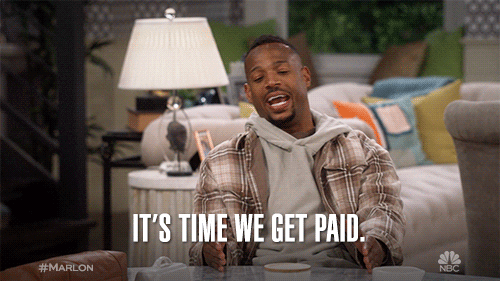

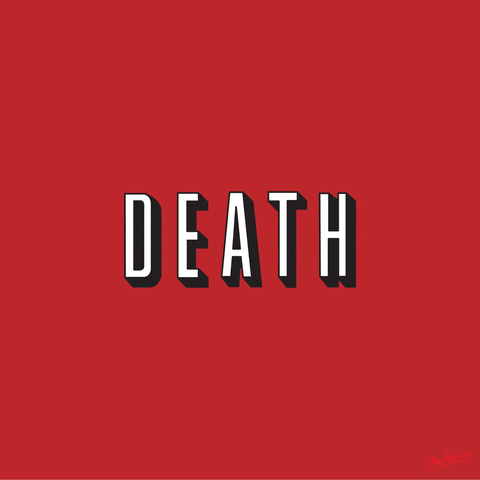
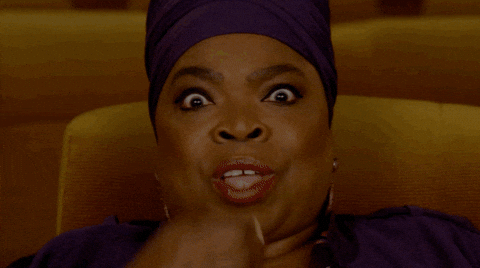
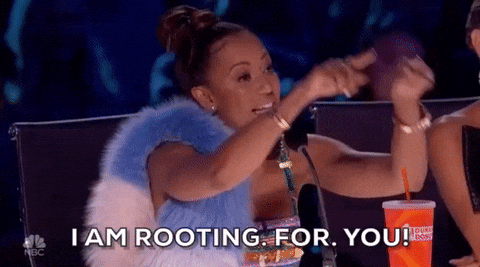
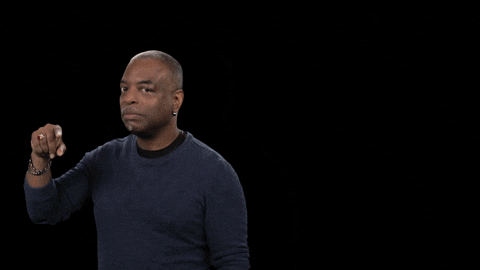

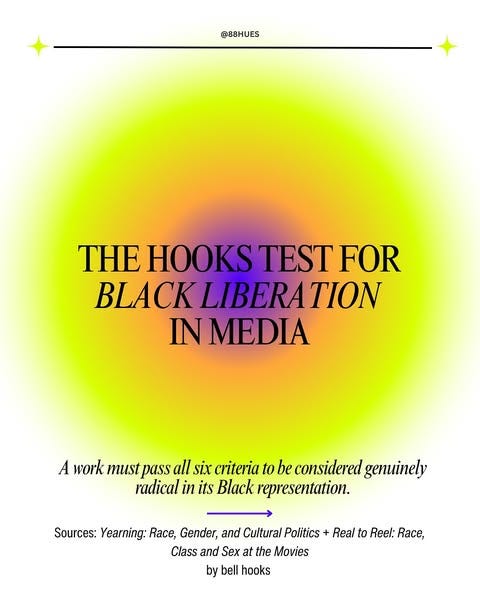




I love this post! I saved the bell hooks test for black filmmakers. I am a writer and want to establish my career in the industry AND also find myself questioning how to approach my pursuits while also upholding my values. This piece adds layers of what is possible. I especially find the guide to be helpful as a framework to root storytelling in authentic black characterization that is limited to what is palatable.
Thank you for this. It's refreshing to see others who want to transform the film industry in a sustainable way and you made excellent points. I myself am developing my own studio to contribute to a much needed renaissance. I used to work at a record label for 4.5 years and want to shift the way we develop video content for music artists as well as bring back BTS content that focus on the creative process. Excited for what the future holds for all of us.